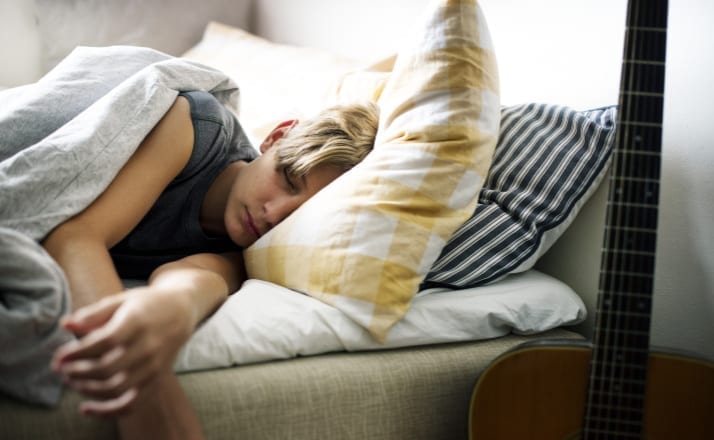Bedtime in our house is 100% hell. I know most of you know this, but I made the stupid assumption that it would get easier as my children got older, but that isn’t true. Not even a little bit. Not even close.
In so many ways, bedtime has gotten worse as my kids have gotten older.
Norah is nine, and Tristan is 12, and getting them to bed on time isn’t just as simple as getting them in the tub, and reading a story. They both have homework.
Tristan has soccer practice twice a week, and Norah has gymnastics once a week. They get home around 3:30 p.m., and between then and 8 p.m. (bedtime), it’s a maddening sprint of urging them to complete all their obligations, while they ask and ask and ask for screen time.
It’s not unusual for the whole family to be at the table, eating dinner, my wife next to our son helping him with math, while I’m next to our daughter helping her with sentences, our four-year-old watching a tablet so she will be occupied.
And it’s not like the summer is any better. The kids just put up a bigger fight over going to bed because it’s summer and they think there are allowed to stay up all night watching YouTube.
And honestly, we have all witnessed our children dragging butt the next morning because they didn’t get enough sleep.
We’ve seen the moodiness. But it turns out there are actually real concerns outside of me just loosing my mind every night and every morning. Not that my mental state is a real concern to my children.
According to the CDC’s National Youth Risk Behavior Survey, “A” students get an average of 30 more minutes of sleep per night (6.71 hours) when compared to “D” and “F” students (6.16 hours). Let’s be real, 30 minutes is a pretty small window of time.
Now does this mean that if you get your kids to bed on time that they will suddenly become A students? Probably not.
The survey shows that getting enough shuteye can put a child in a position to do better in school.
But hey, I’m with you, the last thing I assumed was that a 30-minute sliver of time would make that big of a difference, but here we are.
Just before the end of the school year, I can remember my son got his homework done right after school, ate an early dinner, and then went to soccer practice. He came home, took a shower, and BAM! It was already 8 p.m.
He’d done everything he was supposed to do, and I was proud of him, so I let him stay up an hour later to play games as a reward. But as it turns out, perhaps that isn’t the best strategy.
If you are like our family, we monitor screen time pretty closely, because if I didn’t, all my kids would do is play games and watch Netflix.
Nothing would get done, and they’d most likely never leave the house. However, we do use screen time as a reward, and on days like above, I feel like I’m between a rock and hard place. I want to reward my son for meeting his obligations, but at the same time, I don’t want him falling asleep in class because he stayed up playing games, something that has happened in the past.

Teens not getting enough sleep are twice as likely to engage in unsafe sex.
According to a recent study published in the journal Health Psychology, Teens who consistently did not get enough sleep at any time during the week were nearly twice as likely to engage in unsafe sex, such as not using condoms or having sex under the influence of alcohol or drugs, than those who slept an average of 3.5 extra hours on weekends.
Naturally, the question all parents have is: How much sleep should our children be getting?
The good people at Savvysleeper put together a pretty interesting analysis of the above report from the CDC. According to their analysis, children ages 13 to 18 should be getting 8 to 10 hour of sleep per night. However, 71% of children do not receive the recommended amount of sleep.
Newsflash: The big killer of sleep is screen time.
Among high school students not getting enough sleep at night, roughly 1 in 3 admitted to spending between two and three hours watching TV on school days.
While about 19 percent said they didn’t watch any TV on school days, 14 percent of students juggled their school workload, the possibility of extracurricular activities, and four hours (or more) of TV every night before finally making it to bed. As for video games, among students not getting enough rest during the school week, roughly 28 percent spent over four hours on school nights playing video games.
What this all shines a light on is the importance of sleep for our children.
And I get it, there are some people reading this feeling like they are being shamed for not getting their children to bed onetime.
Or perhaps you feel like you are failing because your kids turn into Godzilla every time you ask them to shut down the screens and get to bed. But how I’d like you to see it is that all that effort you are putting into getting those kiddos to bed is actually a valid fight.
This research just backs up your point, and that even though it can suck, getting your children to understand the value of sleep in essential to their overall well-being. And they probably aren’t getting enough.














